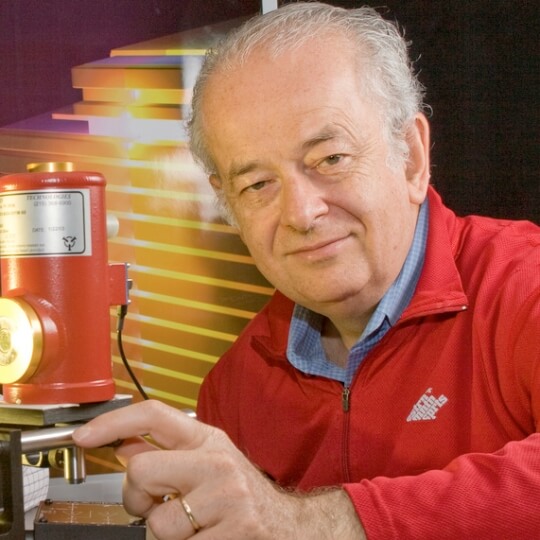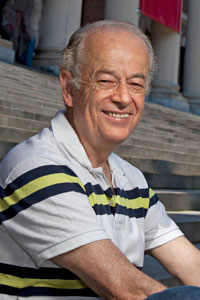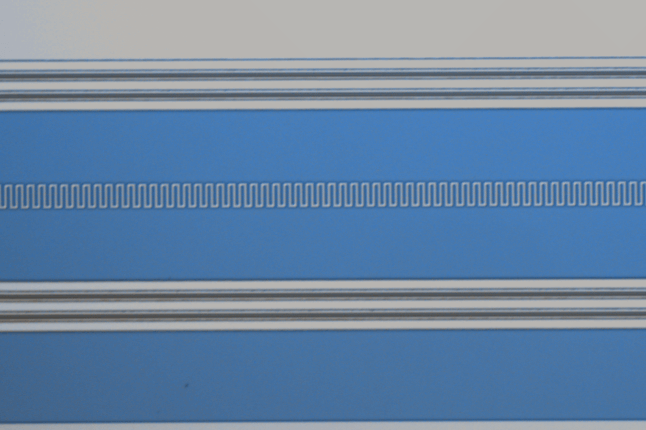News
Federico Capasso, well known for his co-development of the quantum cascade laser, was honored by an French university in December. (Photo by Eliza Grinnell, SEAS.)
Federico Capasso, Robert L. Wallace Professor of Applied Physics and Vinton Hayes Senior Research Fellow in Electrical Engineering at the Harvard School of Engineering and Applied Sciences (SEAS), was among six distinguished academics and intellectuals who received an honorary doctorate (Doctor Honoris Causa) from Université Paris Diderot. The tribute coincided with the institution's 40th anniversary.
Capasso was called a "model to emulate" and "an exemplary 21st-century physicist."
In a booklet that accompanied the ceremony, the selection committee wrote: "His passion for scientific research, his creativity and his ability to transfer quantum effects to concrete applications have for some time been a source of inspiration for the students and scientists at our university."
Capasso received the Doctor of Physics degree, summa cum laude, from the University of Rome, Italy, in 1973. After a 27-year career at Bell Laboratories, he came to Harvard in January 2003.
His research in nanoscale science and technology has covered abroad range of topics starting with his pioneering research on bandgap engineering of artificially structured semiconductor materials and devices.
This research culminated in the invention and first demonstration by Capasso and his group at Bell Labs in 1994 of quantum cascade (QC) lasers. He showed that by varying the thickness of layers in the active region, it is possible to select the wavelength at which a QC laser will emit light, customizing it for a specific application.
Other highlights of his research include the investigation of the Casimir effect (the attraction between any pair of macroscopic bodies due to quantum fluctuations of vacuum) and in particular the first measurement of a repulsive Casimir. He has also worked on plasmonics, demonstrating laser antennas capable of creating high-intensity nanoscale light spots for optical recording and highly collimated beams.
He has been widely honored for his interdisciplinary research infields such as materials science, solid state physics, electronics, and photonics. His honors include membership in the National Academy of Sciences, the National Academy of Engineering, and the American Academy of Arts and Sciences.
In 2005 he received, jointly with Nobel Laureate Frank Wilczek (MIT)and Anton Zeilinger (University of Vienna), the King Faisal International Prize for Science for his research on QC lasers. The citation called him “one the most creative and influential applied physicists in the world.”
Capasso also earned the 2010 Berthold Leibinger Zukunftspreis (the future prize) for excellent research on the application or generation of laser light.
The other recipients of the honorary doctorates from Université Paris Diderot were: Judith Butler, Professor of Philosophy and Critical Theory, University of California, Berkeley; Michael Matthay, Professor of Medicine and Anesthesia, University of California, San Fransisco; Taslima Nasreen, writer; George Papanicolaou, Professor of Mathematics, Stanford University; and John Watts, Professor of Materials Science, University of Surrey, UK.
Topics: Applied Physics
Cutting-edge science delivered direct to your inbox.
Join the Harvard SEAS mailing list.
Scientist Profiles
Federico Capasso
Robert L. Wallace Professor of Applied Physics and Vinton Hayes Senior Research Fellow in Electrical Engineering




